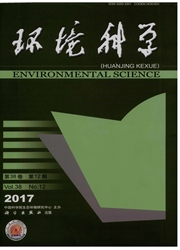

 中文摘要:
中文摘要:
接种硝化污泥以优势菌种法挂膜,在D0浓度为1.5~2.0mg/L,温度为(30±1)℃,HRT为24h的条件下,以pH控制启动移动床完全亚硝化生物膜反应器,并研究了氨氮负荷(NLR)和水力停留时间(HRT)对系统稳定性的影响.结果表明,在进水氨氮浓度为150mg/L的情况下,pH控制在7.7~8.2,经过10d驯化生物膜系统达稳定的完全亚硝化状态,氨氮转化率达96%以上,亚硝酸盐积累率高于95%;NLR(以NH4^+-N计)从0.15kg/(m^3·d)提高到0.24kg/(m^3·d)基本不影响完全亚硝化的稳定性,氨氮转化率高于90%,亚硝酸盐积累率始终维持在96%左右;低NLR下,延长HRT由于过度曝气导致硝化类型改变为完全硝化,然而缩短HRT仍可恢复为亚硝化.
 英文摘要:
英文摘要:
Complete nitritation process in an biofilm moving bed system was started-up by inoculating nitrobaeteria and controlling pH, and the effects of nitrogen loading rate(NLR) and hydraulic retention fime(HRT) on the stability of the system were investigated. The results showed that the system could achieve complete nitritation after 10 day's acclimation by controlling pH within the range of 7.7 - 8.2, under the conditions of temperature (30 ± 1 )℃ , DO 1.5 - 2.0 mg/L, HRT 24 h, ammonia concentration 150 mg/L. Conversion rate of ammonia was above 96% and nitritation rate(NO2^-N/NOx^-N) was more than 95% . In addition, the system remained complete nitritation when NLR increased from 0.15 kg/(m^3·d) to 0.24 kg/(m^3·d), and conversion rate of ammonia was still above 90%, nitritation rate maintained at 96%, but the type of nitrification turned from completely nitritation to completely nitrification under the condition of over aeration by extended HRT under low NLR. However, it could be resumed by shortened HRT.
 同期刊论文项目
同期刊论文项目
 同项目期刊论文
同项目期刊论文
 期刊信息
期刊信息
